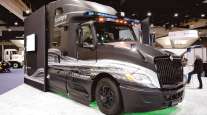GM’s Cruise Names Interim CEO Vogt Full-Time Chief

[Stay on top of transportation news: Get TTNews in your inbox.]
Cruise LLC, the autonomous vehicle company that is majority-owned by General Motors Co., named founder Kyle Vogt its full-time chief executive officer.
Vogt has been the interim CEO since Dan Ammann left Cruise in December following disagreements with GM Chair and CEO Mary Barra. At the time, GM said it would look for a permanent leader for Cruise.
“Some fun news: I have formally accepted the CEO job at Cruise once again,” Vogt said Feb. 28 on Twitter, confirming an earlier Bloomberg report. “Where will we be in another decade? I can’t wait to show you.”
Some fun news: I have formally accepted the CEO job at @Cruise once again. — Kyle Vogt (@kvogt) February 28, 2022
Putting Vogt atop Cruise signals that its mission to develop self-driving vehicles and robotaxi services will remain on course even as GM leadership has taken a bigger hand in running the unit. Vogt founded the company before GM bought it in 2016 and has been a guiding force for its software development.
Now he will be leading Cruise into its next stage, which is getting its self-driving ride hailing business on the road and expanding it to other cities. Cruise has been giving people free rides in San Francisco and testing out the service.
The company is preparing to launch its robotaxi service and charge fares in San Francisco, its primary base of operations. Cruise has a permit to give rides without a safety driver, and is awaiting a nod on its application with the California Public Utilities Commission to charge for those rides.

Host Michael Freeze discusses cleaner emissions and the GHG Phase 2 rule with Taki Darakos of Pitt Ohio and Dustin Smith at Wabash. Hear a snippet above, and get the full program by going to RoadSigns.TTNews.com.
“The company is fortunate to be in this phase where now it’s about scaling,” Vogt said in a phone interview. “It’s a different chapter in the company, a different phase and I feel ready to move us forward.”
Once the company deploys in San Francisco, the plan is to develop the autonomous ride-hailing business and grow to other cities in the U.S. and around the globe. Cruise said that it plans to expand revenue to more than $50 billion before the end of the decade.
Even if the CPUC gives Cruise permission in the coming months, it could take time to scale up the business to a large fleet of driverless vehicles. The company needs to develop a fleet and a means to manage and coordinate the service.
“That’s one of those things where you can try to come up with all the requirements ahead of time and imagine what the service is going to require to operate smoothly but there’s no substitute for real-world operation,” Vogt said. “We’re gaining that experience now.”
The self-driving unit’s growth is a big piece of how GM expects to double revenue by 2030, the company said in October.
Vogt started the business in 2013 and was CEO of Cruise when GM acquired it in 2016. He held the post until Ammann, GM’s former president, moved to the autonomous business in 2019.
When Ammann became CEO, Vogt took the title of chief technical officer and led software development. His ties to driverless technology go back about two decades. Vogt went to Massachusetts Institute of Technology and participated in the 2004 Darpa challenge, in which universities and companies put their expertise together to develop self-driving technology.
With Vogt leading development, Cruise has been in a race with Alphabet Inc.’s Waymo and other startups to deploy self-driving vehicles services first.
On Ammann’s watch, Cruise raised more than $6 billion from SoftBank Vision Fund, T. Rowe Price and Associates, Honda Motor Co., and Microsoft Corp. GM puts in about $1 billion a year to develop self-driving capabilities and aims to eventually start a fleet of robotaxis.
GM had given Ammann shares and financial incentives to take the company public within 10 years. Ammann wanted the company to go public sooner than Barra did, and wanted more autonomy running the company — disputes that contributed to his dismissal in December, Bloomberg has reported.
Want more news? Listen to today's daily briefing above or go here for more info
Investors have been nudging GM to consider a spinoff of Cruise as a means to create more value. Barra has resisted, saying that the company needs more time to develop the technology and the business before any kind of separation.
Vogt is aligned with Barra on that point. He said the company has plenty of cash and access to capital from GM’s lending arm to buy vehicles from the automaker. Cruise will first launch its service using self-driving versions of the electric Chevrolet Bolt and will eventually use the Cruise Origin, a four-to-six-passenger vehicle designed just for the robotaxi business.
“We’ve got plenty funding, so things like an IPO are not critical at this point,” Vogt said.
GM hasn’t decided to keep Cruise in-house forever, Barra said at the Wolfe Research investor conference last week. “We’re saying this is what we’re going to do for our investors over time to maximize value creation.”




